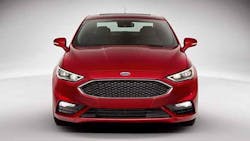Ford Says It's Still Profitable if Auto Sales Drop 30%
Ford Motor Co., responding to investor fears that the U.S. auto market is peaking, told analysts it could still earn a profit even if the industry’s sales plunged 30 percent in one year.
Investors traded down Ford shares 3.1% this year through yesterday on concern that the U.S. auto expansion has peaked and earnings will be pressured. Ford, which reported record pretax profit of $10.8 billion for last year, is viewed as vulnerable to repeating its near-death experience of seven years ago when it had to close plants, cut thousands of job and mortgage all its assets to get life-saving loans.
“We were in such bad shape back then,” Chief Financial Officer Bob Shanks told analysts Tuesday at a meeting in New York. “We are a much different company now.”
The company’s stock fell 0.7% to $13.57 at 3:26 p.m. in New York.
Ford could now break even financially if annual U.S. auto sales fell to 11 million, a 37% decline from last year’s record 17.5 million cars and light trucks, Shanks said.
With lower costs, stronger products and a better balance sheet, Ford now can remain profitable with a 30% drop in industrywide sales, a 37% decline in its dealers’ stock of cars and a 2% decline in net revenue in the first year of a downturn, he said. If sales didn’t improve the next year, Ford would no longer make a profit, Shanks said.
In such a market collapse, Ford could cut its costs by $3 billion in the first year, with $1 billion coming from its manufacturing operations, the finance chief said.
“We would adjust production to fit demand and do that very, very quickly,” Shanks said.
Job Cuts
As evidence of how Ford is more nimble now, Shanks pointed to the moves the company has made to adjust factory output to a decline in demand for fuel-efficient small cars. Ford cut a shift of workers at a Michigan small-car plant and plans to move production of those models outside the U.S. Ford also has stopped building its Fusion mid-sized sedan in Michigan and now makes it only in Mexico, where labor costs are lower.
Ford plans to maintain a dividend, keep its investment-grade credit rating and continue to invest in new models in the next downturn, Shanks said. The company was helped by recent credit upgrades, which “gives us a little bit of extra cushion,” Shanks said.
“That extra step away from junk is very important,” he said.
In past downturns, the second-largest U.S. automaker had to scramble to react to events that overtook its plans. Next time, Ford will be more prepared and has a detailed plan to protect profitability, Shanks said.
“We want to have a forward lean into” situations, Shanks said, “whether it’s an upside or a downside scenario.”
About the Author
Bloomberg
Licensed content from Bloomberg, copyright 2016.
